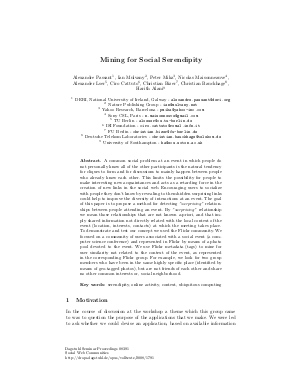08391 Group Summary – Mining for Social Serendipity
Authors Alexandre Passant, Ian Mulvany, Peter Mika, Nicolas Maisonneuve, Alexander Löser, Ciro Cattuto, Christian Bizer, Christian Bauckhage, Harith Alani
-
Part of:
Volume:
Dagstuhl Seminar Proceedings, Volume 8391
Part of: Series: Dagstuhl Seminar Proceedings (DagSemProc) - License:
 Creative Commons Attribution 4.0 International license
Creative Commons Attribution 4.0 International license
- Publication Date: 2008-12-22
File

PDF
DagSemProc.08391.3.pdf
- Filesize: 252 kB
- 11 pages
Document Identifiers
Subject Classification
Keywords
- Serendipity
- online activity
- context
- ubiquitous computing
Metrics
- Access Statistics
-
Total Accesses (updated on a weekly basis)
0PDF Downloads0Metadata Views
Abstract
A common social problem at an event in which people do not personally know all of the other participants is the natural tendency for cliques to form and for discussions to mainly happen between people who already know each other. This limits the possibility for people to make interesting new acquaintances and acts as a retarding force in the creation of new links in the social web. Encouraging users to socialize with people they don't know by revealing to them hidden surprising links could help to improve the diversity of interactions at an event. The goal of this paper is to propose a method for detecting extit{"surprising"} relationships between people attending an event. By extit{"surprising"} relationship we mean those relationships that are not known a-priori, and that imply shared information not directly related with the local context of the event (location, interests, contacts) at which the meeting takes place. To demonstrate and test our concept we used the Flickr community. We focused on a community of users associated with a social event (a computer science conference) and represented in Flickr by means of a photo pool devoted to the event. We use Flickr metadata (tags) to mine for user similarity not related to the context of the event, as represented in the corresponding Flickr group. For example, we look for two group members who have been in the same highly specific place (identified by means of geo-tagged photos), but are not friends of each other and share no other common interests or, social neighborhood.
Cite As Get BibTex
Alexandre Passant, Ian Mulvany, Peter Mika, Nicolas Maisonneuve, Alexander Löser, Ciro Cattuto, Christian Bizer, Christian Bauckhage, and Harith Alani. 08391 Group Summary – Mining for Social Serendipity. In Social Web Communities. Dagstuhl Seminar Proceedings, Volume 8391, pp. 1-11, Schloss Dagstuhl – Leibniz-Zentrum für Informatik (2008)
https://doi.org/10.4230/DagSemProc.08391.3
BibTex
@InProceedings{passant_et_al:DagSemProc.08391.3,
author = {Passant, Alexandre and Mulvany, Ian and Mika, Peter and Maisonneuve, Nicolas and L\"{o}ser, Alexander and Cattuto, Ciro and Bizer, Christian and Bauckhage, Christian and Alani, Harith},
title = {{08391 Group Summary – Mining for Social Serendipity}},
booktitle = {Social Web Communities},
pages = {1--11},
series = {Dagstuhl Seminar Proceedings (DagSemProc)},
ISSN = {1862-4405},
year = {2008},
volume = {8391},
editor = {Harith Alani and Steffen Staab and Gerd Stumme},
publisher = {Schloss Dagstuhl -- Leibniz-Zentrum f{\"u}r Informatik},
address = {Dagstuhl, Germany},
URL = {https://drops.dagstuhl.de/entities/document/10.4230/DagSemProc.08391.3},
URN = {urn:nbn:de:0030-drops-17910},
doi = {10.4230/DagSemProc.08391.3},
annote = {Keywords: Serendipity, online activity, context, ubiquitous computing}
}
